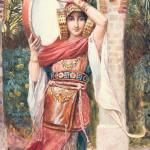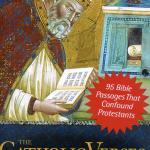
Who said this?:
1) It is enough for me that Christ’s blood is present; let it be with the wine as God wills. Before I would drink mere wine with the Enthusiasts, I would rather have pure blood with the Pope.
And this?:
2) . . . Zwingli, Karlstadt, Oecolampadius [Protestants] . . . called him a baked God, a God made of bread, a God made of wine, a roasted God, etc. They called us cannibals, blood-drinkers, man-eaters . . . even the papists have never taught such things, as they clearly know . . . For this is . . . how it was accepted in the true, ancient Christian church of fifteen hundred years ago . . . When you receive the bread from the altar, . . . you are receiving the entire body of the Lord; . . .
And this?:
3) [I]f Luther has so great a lust of victory, he will never be able to join along with us in a sincere agreement respecting the pure truth of God. For he has sinned against it not only from vainglory and abusive language, but also from ignorance and the grossest extravagance. For what absurdities he pawned upon us in the beginning, when he said the bread is the very body! And if now he imagines that the body of Christ is enveloped by the bread, I judge that he is chargeable with a very foul error. What can I say of the partisans of that cause? Do they not romance more wildly than Marcion respecting the body of Christ? . . .
And this?:
4) In their madness they even drew idolatry after them. For what else is the adorable sacrament of Luther but an idol set up in the temple of God?
And these statements?:
5) May I be lost if he [Martin Luther] does not surpass Faber in foolishness, Eck in impurity, Cochlaeus in impudence, and to sum it up shortly, all the vicious in vice.
6) Let Luther acknowledge that he is being led by a spirit far different from that of Christ.
7) Besides, we godless and unforbearing “un-Christians” must put up with having these holy and moderate teachers revile us as idolaters and having our God called the baked God, the edible and potable God, the bread-God, the wine-God, and ourselves called God-forsaken Christians and such names. This altogether venomous, devilish abuse exceeds all bounds. Now a person would rather be upbraided for being full of devils than have a “baked God.”
8) . . . loathsome fanatics . . . murderers of souls . . . [who] possess a bedeviled, thoroughly bedeviled, hyper-bedeviled heart and lying tongue . . . [who] have incurred their penalty and are committing sin which is mortal, . . . blasphemers and enemies of Christ . . . Gods and our condemned enemies.
9) . . . full-blown heathen . . . I am certain that Zwingli, as his last book testifies, died in a great many sins and in blasphemy of God.
10) He went so far as to call Zwingli a non-Christian (Unchrist), and ten times worse than a papist . . . . He saw in the heroic death of Zwingli and the defeat of the Zurichers at Cappel (1531) a righteous judgment of God, and found fault with the victorious Papists for not exterminating his heresy.
[see answers below]
SOURCES
1) Martin Luther, in Althaus, 376; from the early 1520s; cf. LW (Luther’s Works), vol. 37, 317.
2) Martin Luther, Brief Confession Concerning the Holy Sacrament, September 1544; LW, 38, 291-292.
3) John Calvin, Letter to Martin Bucer, January 12, 1538; in Dillenberger, 47.
4) John Calvin, Letter to Martin Bucer, June 1549; in Bonnet, V, 234.
5) Ulrich Zwingli, Letter to Conrad Sam of Ulm, August 30, 1528; in Grisar, III, 277.
6) Martin Bucer, 1527; in footnote 19 in LW, vol. 37, 21, for Luther’s treatise, That These Words of Christ, “This is My Body,” Etc., Still Stand Firm Against the Fanatics.
7) Martin Luther, That These Words of Christ, “This is My Body,” Etc., Still Stand Firm Against the Fanatics, LW, vol. 37, 22; directed towards the Protestant “sacramentarians”: those who denied that Christ was truly, substantially present after the consecration of the elements (folks like Oecolampadius, Bucer, and Zwingli).
8) Martin Luther, Brief Confession Concerning the Holy Sacrament, September 1544, in LW, vol. 39, 292, 296, 302, 316; describing Protestants Zwingli, Karlstadt, and Oecolampadius.
9) Martin Luther, ibid., LW, vol. 29, 290, 302-303; describing Zwingli.
10) Protestant historian Philip Schaff, describing Martin Luther’s view of Zwingli; The Creeds of Christendom, Vol. I, 1877, revised 5th edition of 1884; this is from the 6th edition from 1931; Chapter Six, section 45; p. 260. Primary sources: March, 1528: Great Confession on the Lord’s Supper, Wider etliche Rottengeister, Letter to Albrecht of Prussia, April, 1532, in De Wette’s edition of L. Briefe, Vol. IV. pp. 352, 353.
BIBLIOGRAPHY
Paul Althaus, The Theology of Martin Luther, translated by Robert C. Schultz, Philadelphia: Fortress Press, 1966.
Jules Bonnet, editor, John Calvin: Selected Works of John Calvin: Tracts and Letters: Letters, Part 2, 1545-1553, volume 5 of 7; translated by David Constable; Grand Rapids, Michigan: Baker Book House, 1983; reproduction of Letters of John Calvin, volume II (Philadelphia: Presbyterian Board of Publication, 1858).
John Dillenberger, editor, John Calvin: Selections From His Writings, Garden City, New York: Doubleday & Co. (Anchor Books), 1971 (Calvin’s letter to Martin Bucer in 1538 was translated by Marcus Robert Gilchrist).
Hartmann Grisar, Luther, translated by E. M. Lamond, edited by Luigi Cappadelta, six volumes, London: Kegan Paul, Trench, Trubner & Co., 1915.
Martin Luther, Luther’s Works (LW), American edition, edited by Jaroslav Pelikan (volumes 1-30) and Helmut T. Lehmann (volumes 31-55), St. Louis: Concordia Pub. House (volumes 1-30); Philadelphia: Fortress Press (volumes 31-55), 1955.
***
(8-23-09)
Photo credit: [Max Pixel / CC0 public domain license]
***













